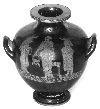GREEK MEN: Men ran the government in Ancient Greece. That is why they spent most of their time away from home. And when they were not involved in politics or fighting a war, they spent most of their time in the fields; working or overseeing the work of slaves. They also engaged in manufacturing, trade, and sailing. For fun, Greek men wrestled, joined the Olympic Games, or went horse-back riding. They enjoyed many more rights than the women.
GREEK WOMEN: In Ancient Greece, you could say you were unlucky if you were a girl, if you were not Spartan. Women in Greece maily stayed at home. They were house wives, so they were in charge of cooking, cleaning, sewing,bearing children (preferably male) and taking care of them, and other house chores. Also, Greek women were in charge of the harvest. If she was poor, the Greek woman would have to do all this by herself, but usually there were female slaves to help with carrying the water from the fountain, and other tedious jobs. Male slaves also helped by being
GREEK BABIES: Even back then, the Ancient Greeks had special rituals for new-born babies. The father of the new-born carried the baby, and danced (ritual) around the house naked. Friends and relatives sent gifts. The family decorated their doorway with a wreath of olives if it was a boy, and a wreath of wool if it was a girl, to let every one know about the wonderful news. Ancient Greeks considered their children to be youths till the age of 30!
GREEK GIRLS: In Athens, as in most Greek
city-states, with the exception of Sparta, girls stayed at
home until they were married. Like their mother,
they could attend certain festivals, funerals, and visit neighbors for
brief periods of time. Their job was to help their mother, and to help
in the fields, if necessary.
GREEK BOYS: In most Greek city-states, when
young, the boys stayed at home, helping in the fields,
sailing, and fishing. At age 6 or 7, they went
to school.
SLAVES: Slaves were very important to ancient
Greek daily life. Slaves cleaned and cooked, worked in
the fields, factories, shops, in the mines, and
on ships. Even the police force in ancient Athens was made
up of slaves! The life of slaves was not
that different from a poor Greek citizen's life.
There were things a slave could not do though.
Slaves could not go to school, or enter politics, or use their own
name. They were given a name by the citizen who
owned them. They were the property of their owner,
not citizens of ancient Greece.
People became slaves in many ways. Some people
became slaves when captured in battle. Some were the
children of slaves. Some were Greek infants,
abandoned on a hill or at the gates of a town, left to die, or
to be rescued by someone passing by. Some children
were sold into slavery by poor families, and some
children were kidnapped. Slaves were so important
to the culture of ancient Greece, that some historians
believe there were as many slaves as citizens!
TOYS: Ancient Greek children played with
many toys, including rattles, little clay animals, horses on 4
wheels that could be pulled on a string, yo-yo's,
and terra-cotta dolls.
PETS: Birds, dogs, goats, tortoises, and
mice were all popular pets! Cats, however, were not!
![]()
Home-The Greek Games-Education
-Food
Clothes & Hair Styles-Greek
Weddings
The Greek House-People
References-Conclusion